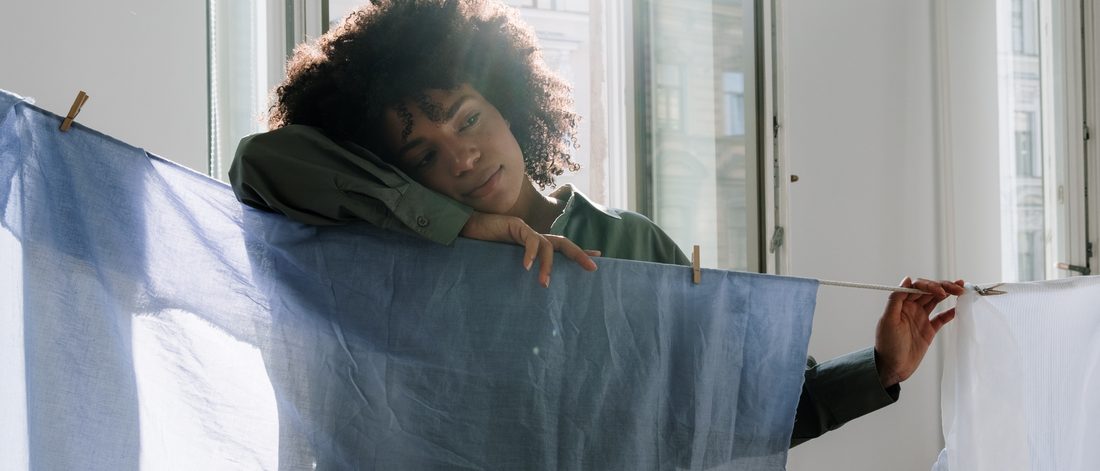Looking after our clothes and keeping them for longer is one of the most effective ways of reducing the carbon footprint of our wardrobes.
But before we talk about laundry we have to address product quality and functionality.
It goes without saying that it’s harder to keep a lower quality fabric in good shape than a higher quality one. That’s why we only supply the highest quality MMCFs (man-made cellulosic fibres) we can find, made from certified fibres and crafted into fabric by reputable manufacturers.
Secondly, no garment will last if it’s made from a fabric that isn’t appropriate for its design or function. Tencel™ and Ecovero™ Viscose are luxury fabrics that you should expect to keep in your wardrobes for many years of service. But they are not everyday workhorses that will withstand aggressive use and washing. Save the heavy lifting for hemp and heavy cottons.
Lastly, did you know that your polyester thread could actually be causing your clothing to wear out faster? Polyester thread is significantly stronger than most natural fabrics so when used to create seams it actually damages the fabric as it sews. During wear the disproportionate strength of the seam to the surrounding fabric actually causes extra stress on the fabric leading to eventual tearing. We recommend Tencel™ or organic cotton sewing thread to extend the life of your garment because it’s much easier to mend a busted seam than torn fabric!
Curious about making the switch to natural threads? Head to our blog post where we answer all your natural thread questions.
Time to air out that dirty laundry!
All our fabrics have specific care instructions on their product pages but here are some general care tips worth following when dealing with Tencel™ or Ecovero™ Viscose.
1. Wash on a cold and treat gently.
Please always refer to your specific fabrics instructions but most cellulosic fabrics should be washed at or below 30º. Tencel™ and Ecovero™ Viscose are sensitive to abrasion, so to avoid them being bashed around too much in your machine make sure you’re not doing too light a load as this gives more room in the drum for your clothes to move around. Additionally, try putting your item in a laundry bag then rolling it up neatly and securing with safety pins. It will still clean your item but will be subjected to much less abrasion and its the abrasion during washing that causes fabric wear out.
2. Use a non-bio washing detergent.
Bio detergents contain enzymes that help to remove stains but these can also damage fibres and aggravate sensitive skin. Always use the recommended amount of washing powder or liquid, using too much can cause a build up of detergent on your clothes impacting its performance. Some washing powders may not dissolve completely in a fully cold wash (under 30º) so if you’re using a cold wash you may prefer to use a liquid detergent.
3. No fabric softener or comforter.
Fabric softeners deposit a layer of electrically charged chemical compounds on the fabric. This makes it feel soft and reduces static but also interferes with natural moisture wicking abilities and ultimately damages the fibres long-term. For delicate and natural fibres it’s a no-no.
4. Air dry out of direct sunlight.
Excessive UV light exposure can make the fibres weak and brittle, leading to increased tears and general wear, as well as fading colours. Ideally dry your garments in a shaded area and turn them inside out to preserve the colour on the outer fabric for longer.
5. No tumble drying.
The heat and abrasion caused by tumble drying is damaging to most fibres but particularly more delicate fibres such as wool, silk and MMCFs. High temperatures may also cause excessive shrinkage. If you want to extend the life of your garments, avoid the tumble dryer.
6. Iron with a low temperature.
These fabrics can wrinkle, particularly the lighter weight versions, so some ironing is inevitable. It is best to gently steam to remove creases, either with a steamer or the steam setting on your iron. When pressing make sure your iron is set to a low heat and/or use a press cloth for protection. Never expose these fabrics to direct high heat as this will damage the fibres and can leave a shiny burn mark.
Remember. Every garment and every fabric has a life expectancy, and the more they are washed the quicker they will reach it. Washing your garments as infrequently as possible is the single most effective way of increasing their longevity. Spot treat stains rather than washing, hang to air out between wears and have you considered a good spritz of vodka? (For your clothes, not you although no judgement here - anyway, google it!) Our Tencel™ and Ecovero™ Viscose are breathable fabrics. On their own, or when blended with other natural fibres they probably need less washing than you think!
Want to learn more about Viscose fibres, how they are made and their environmental and social impact? Check out our blog WTF is Viscose?
”Look after your clothes like the good friends they are” Joan Crawford

